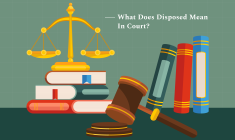When a personal injury case is filed against someone for bodily, mental, or reputational harm, the claim is rarely unfounded. It can, however, be argued.
Upon notification of the lawsuit, you want to consult with a personal injury defense attorney for guidance on how to respond and the evidence to present to diminish your part in the incident.
Understanding Personal Injury Claims
Personal injury primarily involves cases of negligence and can include incidents of intentional harm. Visit – A Beginner’s Guide to Personal Injury Claims – for a guide on personal injury claims. Common claims under this law are as follows:
Premises liability
Slip and fall accidents cases are a common form of premises liability. An individual could sue you if they slipped and fell on your property due to hazardous conditions that you failed to correct. However, you can respond with a contributory negligence claim.
Vehicle accident
A large portion of personal injury cases are for vehicle accidents, including single/multi-car accidents, motorcycle accidents, truck accidents, head-on collisions, sideswipe accidents, rear-end collisions, rollover accidents, and pedestrian accidents.
If someone suffers injuries from a collision you caused, your insurance carrier must cover their loss.
Dog bite
You will be held responsible if someone files a personal injury claim against you because your dog bites them. These claims fall under the strict liability rule. However, if the individual was trespassing on your property, you have a solid response to their claim.
Wrongful death
When a death results from a personal injury accident, a loved one can file suit for damages.
When a personal injury claim is filed against you, an attorney will help build a defense to at least minimize the damages you’re responsible for.
Personal Injury Compensation: Understanding Potential Compensatory Damages

The losses a personal injury victim suffers in an incident caused by another person is referred to as “damages.” The types of recoverable damages vary for each claim, but most cases will follow a variation of these economic damages.
- Current medical bills, including future treatments if long-term recovery is required
- The total lost income resulting from missed work, loss of earning capacity and lost benefits
- The cost to repair/replace damaged property from the incident, such as a vehicle in an accident claim
- Funeral and burial or cremation costs for a person who passes in a wrongful death case
All out-of-pocket expenses pertinent to the injury, including household help or transportation costs to medical visits
Compensatory damages also refer to non-economic losses, including negative mental health changes. This can include pain and suffering, loss of companionship or consortium, loss of enjoyment for life, emotional distress, mental anguish, and disfigurement.
Further, being diagnosed with PTSD – post-traumatic stress disorder, anxiety, or depression, can also prove mental state changes following an incident.
When a personal injury claim is filed against you, you want to reach out to your insurance carrier. They may hire a quality and qualified personal injury attorney like Belluck Law in Gloversville, a successful practice with a proven track record.
If your insurer doesn’t reach out to Belluck Law LLP, you should speak to them right away since you only have a set number of days to respond to the allegations and demands.
Personal Injury Compensation: Defending The Allegations in a Personal Injury Suit
Denying the allegations is the most common defense in when a claim is brough against someone. However, you may claim shared fault if you bear responsibility, alleging the other party played a part in causing the incident. Each state has rules governing shared fault with some being more stringent than others.
Comparative guidelines for shared responsibility from one state to the next generally follow these rules.
Comparative negligence
Most states follow these rules, which state that the plaintiff can recover damages; however, the court will deduct a percentage of fault from the total. Further, states specifically adhere to either modified or pure comparative negligence.
Modified allows compensation only if the plaintiff is less than half at fault, whereas pure allows compensation for fault of any percentage below 100 percent.
If you live in a state that adheres to the modified comparative negligence rule, and you provide enough evidence to support that the plaintiff has a greater portion of fault in the incident than you, you could avoid paying damages.
Contributory negligence
Only a small number of states adhere to this rule as it affirms that the plaintiff is not entitled to compensation if they contributed to the incident in any way. If your attorney can prove negligence, you can avoid responsibility for damages.
A reputable attorney will first review the allegations and demand to look for areas to create doubt.
For instance, if there was an extended period of time before the plaintiff sought medical attention for their injuries, mitigation of damages can be argued, alleging that medical treatment was delayed, worsening their condition, deeming them partially responsible for the damages.
Another common argument is when the plaintiff misses the deadline for filing.
All personal injury suits have a statute of limitations that gives a strict deadline by which individuals must file their lawsuit. In most cases, the statute takes effect at the time of the incident, making that the start date.
In New York, the statute of limitations for a personal injury claim is three years, and a wrongful death claim is two years. You have 30 days to respond to a plaintiff’s allegations against you. View here for details on how long you can wait to file a claim.
Your Legal Guide: Get The Best Personal Injury Compensation!
When personal injury allegations are brought against you, you can attempt to investigate the claim without the help of legal counsel.
However, with a skilled defense team like Belluck Law in Gloversville, they will discuss your part in the incident and draft a response to the plaintiff with counter-allegations.
A knowledgeable and experienced lawyer will negotiate on your behalf to try to reach a fair and reasonable settlement and avoid a lengthy and expensive court process.
They protect your rights and strive to build a stellar defense to achieve a successful outcome. Consulting with an attorney specializing in personal injury law is a worthwhile investment when you face liability for an incident or accident resulting in injuries or damages.
Read Also:
















